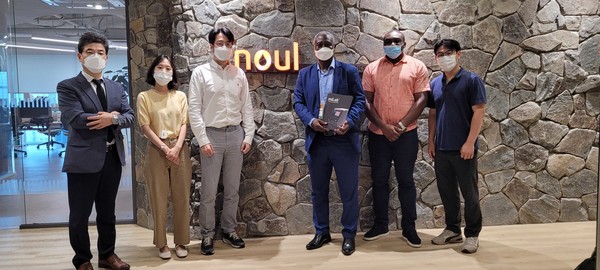Noul, a Korean medical diagnostics company, said on Monday that it signed a memorandum of understanding (MOU) with Institut Pasteur Cameroon to strengthen malaria diagnosis and joint research in the central African country.

Accordingly, the two organizations will collaborate to improve its malaria diagnosis capabilities in Cameroon, including joint research, publication of papers, public procurement support, and manpower exchange.
Noul will provide equipment and manpower, including the miLab diagnostic platform, to Cameroon from the end of 2022. Meanwhile, Institut Pasteur Cameroon will use miLab to conduct joint research on malaria, and actively support Cameroon's local product registration process by securing data and diagnostic performance.
The miLab platform allows physicians to perform diagnostic tests in the blood and tissue cell fields without large equipment and laboratories. Recently, it was evaluated as the "most advanced digital microscope platform that fully integrates all functions" by Unitaid, a global health agency.
Currently, it is used by the Korea Disease Control and Prevention Agency (KDCA), Carlos III Health Institute in Spain, the National Center for Malaria in the United Arab Emirates, and Boston Children's Hospital in the U.S. and its use is rapidly increasing in Africa, especially Nigeria, the world's largest malaria outbreak.
Institut Pasteur Cameroon, a public institution under the Cameroon Ministry of Health, is a state-level diagnostic laboratory for diagnosing various diseases, including malaria, and contributes to monitoring, preventing, diagnosing, and eradicating endemic and infectious diseases in Africa through scientific research in the medical health sector and training.
Malaria has an average of 2.7 million patients per year in Cameroon alone, and its eradication is a top priority for the Cameroonian government since 2019, said a Noul official.
"We will continue to cooperate with various global institutions to expand the miLab platform to the global standard for malaria microscopy,” Noul CEO Lim Chan-yang said. “Through this cooperation, Noul has secured a foundation to pioneer the Cameroon malaria microscope diagnostic market worth about 70 billion won."
Dr. Lawrence Ayong of the Institut Pasteur Cameroon said, "The introduction of miLab into the Cameroon’s current diagnostic system will greatly improve the patient service and solve the shortage of diagnostic professionals by providing a high level of standardized diagnostic tests.”
Ayong added that the institute will try to implement the current malaria reduction strategy by combining its research capabilities with Noul’s innovative technologies.

